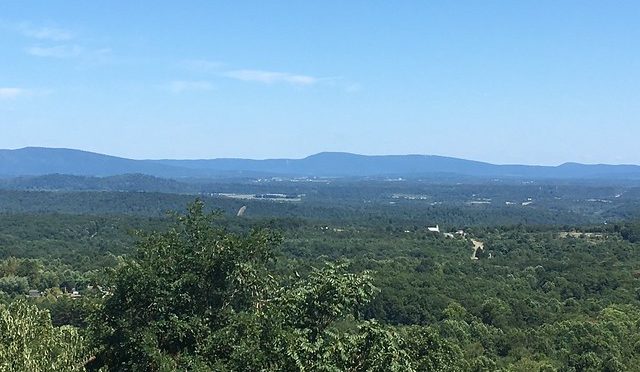I got in my car and told Google Maps to take me to DC via the big highways and non-toll roads I’m used to.
So when I found myself on a 4-lane toll road somewhere in the Laurel Highlands, scrounging my ashtray to see if I could make exact change, honestly, I was pretty pissed.
Fortunately, pulling out of the toll booth, my buddy Terry put on that song he likes.
And he and my friend Ken struck up a conversation about their influences and activities in open education. Before I knew it, I was relaxed, I was thinking about my communities, and I was able to notice that it was a lot nicer to drive on a slightly smaller road, rolling through gentler hills without all the big trucks of I-79.
Terry and Ken weren’t actually in the car, of course. I was listening to them on my podcatcher, doing a crossover episode of their podcasts.
(That’s Terry’s podcast Gettin’ Air; I should give you a link to Ken’s show at The Flipped Learning Network too.)
This is what the digital storytelling community calls “the gift of voice.” It’s all of the human cues – pacing and timbre and volume – which expand and explain our word choices. It’s the speed with which the presence of the other person becomes palpable, as they literally come into the air around us. It’s the ability of my friends’ voices to short circuit road rage.
I find Terry and Ken to have a particularly relaxed style on their podcasts. They make space for spontaneity with their guests, which makes me feel like I’m observing a conversation, not an interview. For a lot of podcasters, I hear them using their NPR-voices and I imagine them in their recording studios, checking their notes, but I often feel like I could walk up on one of Terry’s or Ken’s episodes happening over lunch at a conference.
I should take a step back and attribute that to craft as much as talent. I know both of them do extensive research and craft their interviews thoughtfully, at the same time they leave the space for the conversation to go where it wants to. That balance probably has a lot to do with why I both enjoy their shows and find them useful for learning. This brings up a question of relationship – how much of my enjoyment of their shows comes from the reminder of spending time with my friends? (Probably a lot. It has to help that, through Virtually Connecting, I’ve seen Terry’s and Ken’s homes and offices, and when I see them in my mind, we’re all together at OpenEd in Niagara.) Conversely, if I knew John Kane and Rebecca Mushtare, (http://teaforteaching.com/) or Bonnie Stachowiak (https://teachinginhighered.com/podcast/) or Ed Burger and Jennifer Stayton (https://www.kut.org/topic/higher-ed) or the good folks at Xavier University (https://cat.xula.edu/food/podcast), would I hear their gifts of voice differently? (Also probably a lot, though each of those hosts do have their own style and that would probably play out differently. And even though I’m not buddies with the hosts, I can recommend all those podcasts without reservation.)
For a decade or more, I’ve reflected that my professional development has been moving away from loyalty to organizations which purport to be disciplinary homes, and toward smaller, more tightly knit personal networks. Events and publications are good; it’s nice for someone to do the work of coming up with a reason to get together. But I feel myself growing more in the meals shared and hallway conversations than in the sessions and articles. Growing differently, anyway. Perhaps podcasting also fills my desire for time spent with other people – for the perception of community, even in a one-way medium, in a way that text and for some reason asynchronous video rarely grants. It’s some combination of a memento of time spent together before, and a ritual of being together again.
Which, because having a dusty untended blog isn’t enough, makes me wonder if anyone out there wants to hear more of my voice. I know there are voices I want to hear (because those are the episodes I download first, or grab as one-offs when my friends tell me they’re on a podcast).
I wonder if it’s really wise to publish a call for there to be even more podcasts, when I look at the days and days worth of unlistened-to episodes I’ve already got. But then I think about all the folks whose voices I’d like to hear more regularly (or, if I’m honest about my listening habits, more irregularly) and I think yeah, bring it on.
Image credit: View north from Sideling Hill rest stop, my own photo. Technically, this view would have been a couple hours after the story, but it’s pretty. CC-BY-NC at https://flic.kr/p/2gZgkps

Wonderful, I am glad that you wrote this and yes my episodes are really just conversation. I learn so much from them and they honestly feed my soul.
Each one is wonderful for my own growth but I definitely have episodes where I really felt a connection happen which makes it special. One that is with someone I have not interacted much in the past and never met in person that really did “hit home” for me was my episode with Stacey Roshan: https://podcasts.flippedlearning.org/askthefln/podcast/episode-031-stacey-roshan/
As I joke often with Terry, doing these is a secret that we know about: we get so much from these and it really doesn’t matter what our listeners get. That of course is a bonus and nice but the experience for myself is gold.
Thanks, Ken. That’s an interesting aspect – that you’re sharing your own learning process in the podcast conversation. Which is, of course, a way of offering and modeling community.